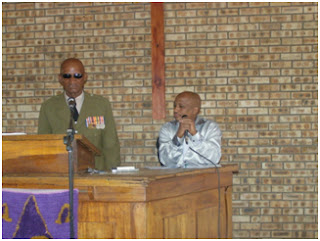 |
| Lucal Mokwena, English Archivist SABC Radio Archives |
The SABC Radio Archives has archivists who focus specifically on a specific radio station and/or an indigenous language. This is part of a series of interviews where the archivists answer some questions addressed to them about their daily work in the archives.
It is a way of getting a better understanding of what an archivist do, as well as getting a better insight into the scope of our collections.
The Archivist answering the questions is Lucal Mokwena, a new archivist who started in the SABC Radio Archives about two months ago.
She is the archivist for English programmes.
1. Lucal, please tell us a little bit about yourself. (Where you grew up, where and what you studied and your work experience before you joined the SABC Radio Archives)
My name is Lucal Morongwa Mokwena and I grew up in Moletsane, Soweto. I studied BA Audio Visual Production Management at the University of Johannesburg. I am currently studying for a Higher Certificate in Archives and Records Management at UNISA. I started working at the SABC in 2008 as an intern for Content Enterprises: Operations Department and then for Summit TV in 2010. Before joining SABC Radio Archives in October I worked at Newsclip Media Monitoring for 2 years as a Broadcast Media Scanner.
2. What is your job description?
As a Sound Archivist my job description entails acquiring of audio material, appraising, editing, cataloguing, quality checking and preserving.
3. Please tell us about a normal day in your studio. What material do you work with?
I work mostly with material from SAFM (drama, book readings, interviews), a bit of Metro FM as well as Radio 2000 on SABC. On a normal day I catalogue on NDM, write CDs and create labels. I also do quality checks and schedule programmes for download on Netlog.
4. Do you struggle with technical difficulties?
Yes, I do struggle technically but I have learned that I don’t have to suffer in silence as my colleagues are always willing to assist.
5. If you have an anecdote about a specific piece of interesting audio material, please share it with us.
Since I have started working here about a month ago I have been listening to drama from SAFM and I must say that its not only entertaining but it is quite informative and educational. One specific audio material which I found very interesting is a book reading on the Nelson Mandela Story. I have read his biography before but it just doesn’t get tiring.
6. Why do you enjoy this work?
I enjoy my work because its new material everyday so its not boring. Also I don’t just preserve material for access but I stay informed on a daily basis.
Related post:
The weekly archivist interview: English Archivist
Blog post by Karen du Toit, Afrikaans Archivist, SABC Radio Archives.








































